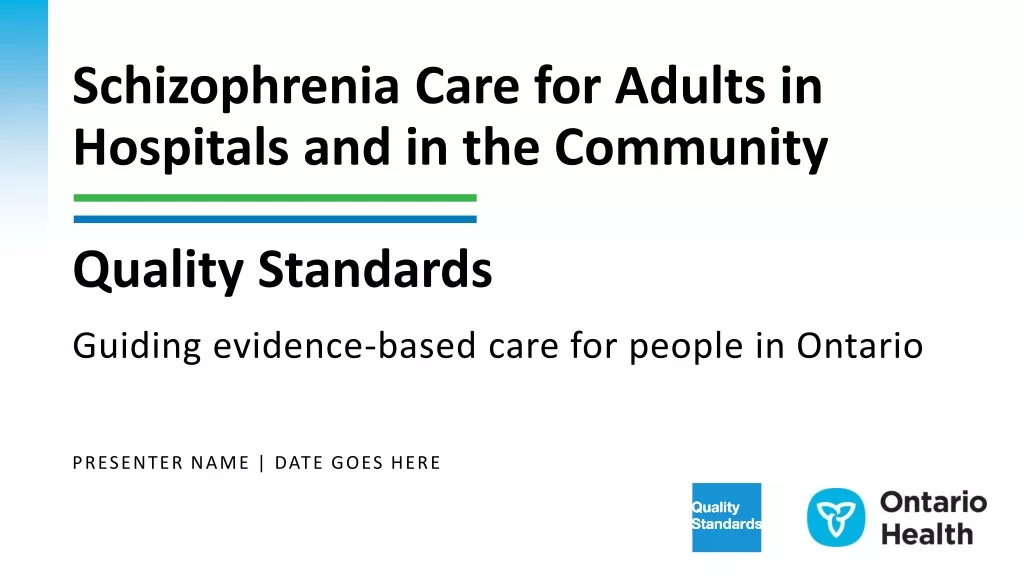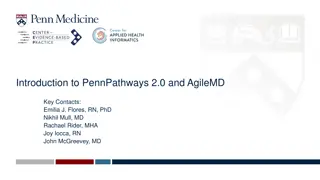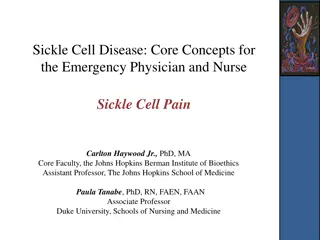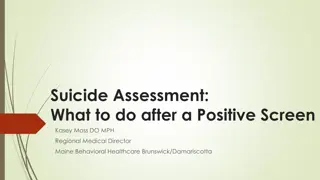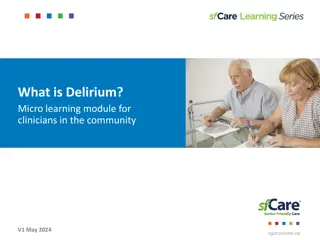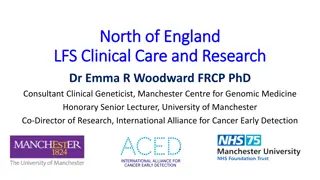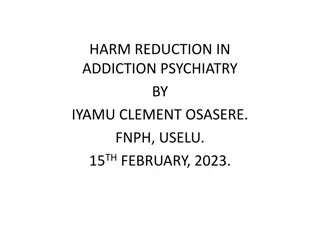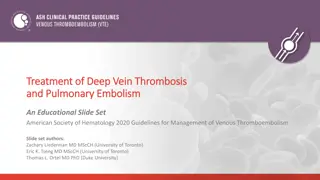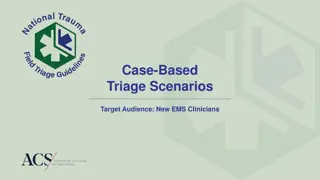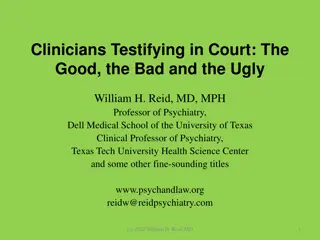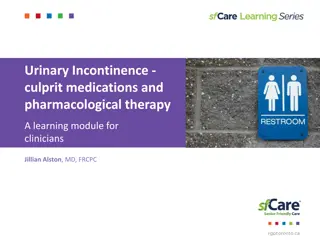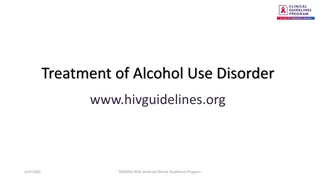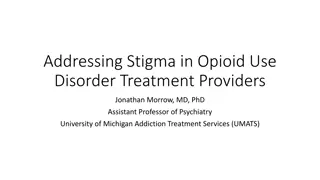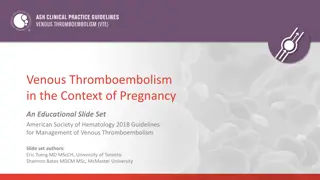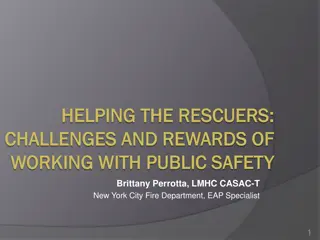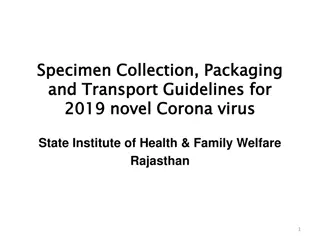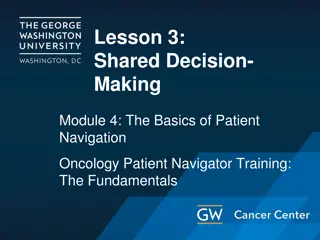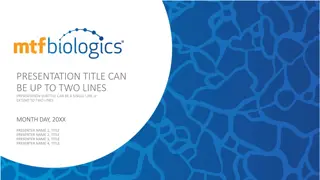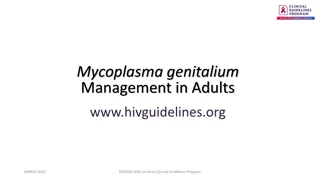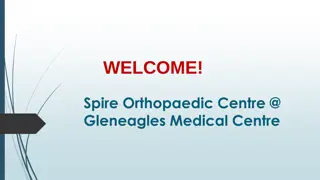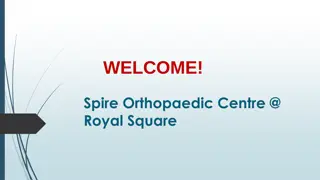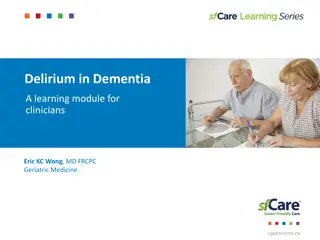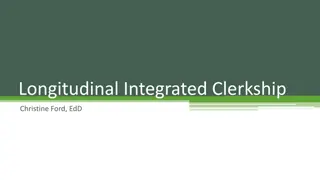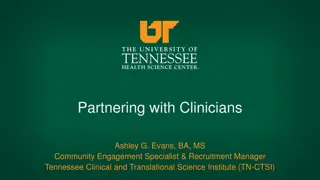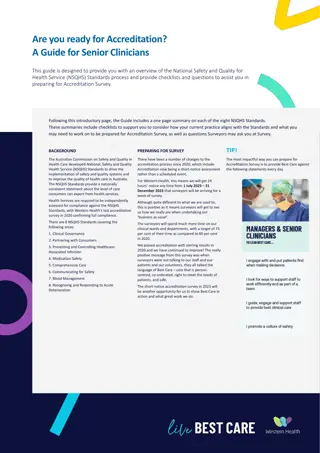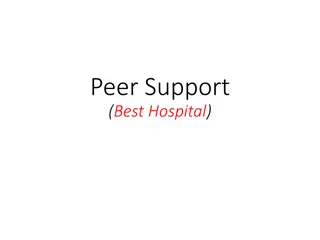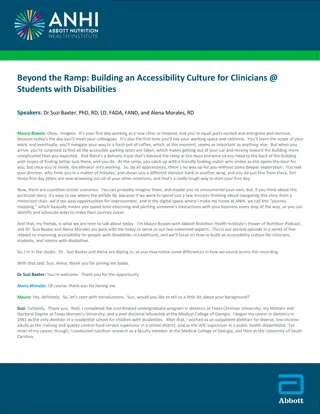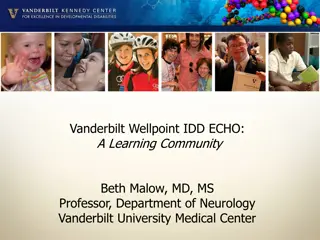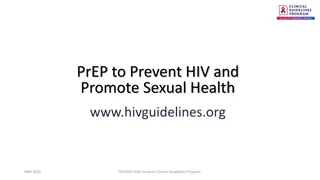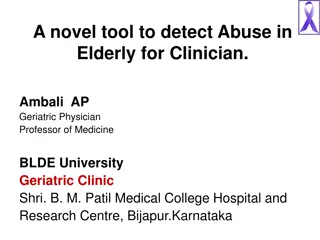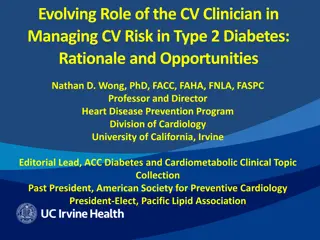Cause of Death Webinar on Death Certification
Join the New York City Department of Health and Mental Hygiene for a webinar on the importance of cause of death certification and the proper reporting process. Learn about the various deaths clinicians certify and the jurisdiction of the Office of the Chief Medical Examiner.
6 views • 42 slides
TRC and Natural Medicines Overview
TRC is a leading medication advisory service founded in 1985 that empowers healthcare professionals to reduce medication errors and improve patient care through original, independent, clinically referenced recommendations. They offer web-based solutions and have high satisfaction rates among pharmac
0 views • 10 slides
Addressing Mental Health Workforce Shortage in New Hampshire
New Hampshire is facing a critical shortage of mental health workers, impacting businesses and services. The demand for mental health services has surged post-pandemic, with a significant gap in wages for community mental health clinicians. Efforts to meet the rising demand include opening new beds
3 views • 12 slides
Mental Health Services Overview at Hampden County Sheriff's Office
Hampden County Sheriff's Office provides a comprehensive range of mental health services and programs for individuals in custody. These services include suicide prevention, evaluation and stabilization units, specialized units, educational and treatment programs, and more. The staff collaborates to
0 views • 32 slides
Schizophrenia Care Quality Standards in Ontario
Explore the quality standards for schizophrenia care in hospitals and communities in Ontario. Learn about the importance of these standards, key quality statements, and measures to support improvement. Discover resources for clinicians, patients, and organizations to ensure consistent, evidence-base
0 views • 69 slides
Opioid Use Disorder Treatment Guidelines 2024
The February 2024 NYSDOH AIDS Institute Clinical Guidelines Program focuses on assisting clinicians in engaging with patients about opioid use disorder (OUD) treatment goals, emphasizing overdose prevention, providing updated information on available treatment options, and offering recommendations f
2 views • 24 slides
CapitalAHP: Preceptorship for Students
CapitalAHP, sponsored by Health Education England, NHS England, and NHS Improvement, offers a structured preceptorship program to aid the transition of AHPs from students to band 5 clinicians. This initiative aims to enhance skills, foster confidence, and promote lifelong learning for AHP profession
1 views • 17 slides
Introduction to PennPathways 2.0 and AgileMD
PennPathways is a program supported by Penn Medicine clinicians, focusing on evidence-based clinical pathways to enhance care quality. AgileMD was chosen to house PennPathways and enable integration with PennChart, offering great support and a proven track record. The project overview includes legac
1 views • 17 slides
Understanding Sickle Cell Disease Pain Management
Sickle cell disease (SCD) patients often experience vaso-occlusive crises (VOC) causing acute pain, a hallmark symptom of the disease. Pain management is crucial in healthcare interactions for these patients, with chronic pain also being a significant concern due to organ/tissue damage. Research sho
1 views • 18 slides
Periodontal Treatment Considerations for Medically Compromised Patients
Patients with significant medical conditions may require special considerations for periodontal treatment. Medical issues such as hemorrhagic disorders, renal diseases, liver diseases, pulmonary diseases, infectious diseases, pregnancy, medications, and cancer therapies can impact oral health and tr
1 views • 87 slides
Understanding Lifestyle Medicine: A Holistic Approach to Health
Lifestyle medicine is a medical specialty focused on using evidence-based lifestyle interventions to treat chronic conditions like cardiovascular diseases, type 2 diabetes, and obesity. Clinicians trained in lifestyle medicine emphasize whole-person care through nutrition, physical activity, stress
10 views • 10 slides
Post-Positive Suicide Screen Protocol & Crisis Services Overview
This presentation by Dr. Kasey Moss discusses systematic approaches to handling positive suicide screenings, connecting youth to care, treatment best practices, clinical strategies, and partnership opportunities for pediatric clinicians. It highlights the importance of crisis services in Maine for c
0 views • 18 slides
Understanding Delirium: A Micro Learning Module for Clinicians
Delirium is a sudden change in an individual's memory, thinking, and behavior, which requires urgent medical attention. Often misdiagnosed, it can be mistaken for other conditions like depression or dementia. Knowing the signs and symptoms, such as fluctuating confusion, difficulty focusing, and cha
1 views • 9 slides
Role of Consultant Clinical Geneticist in Hereditary Cancer Predisposition
Consultant Clinical Geneticists play a crucial role in assessing the risk of high-risk hereditary cancer predisposition, implementing prevention strategies, and early detection through methods like Whole Body MRI. Surveillance involves annual examinations, imaging, and expert coordination between cl
0 views • 12 slides
Harm Reduction in Addiction Psychiatry: A Comprehensive Overview
Harm reduction in addiction psychiatry is a client-centered approach that focuses on reducing negative consequences associated with substance use. This philosophy involves practical strategies and principles aimed at promoting safer drug use practices. The historical background traces the evolution
1 views • 40 slides
ASH Guidelines 2020: Management of Venous Thromboembolism
American Society of Hematology (ASH) released guidelines in 2020 for the management of Venous Thromboembolism, focusing on deep vein thrombosis and pulmonary embolism. These guidelines cover prevention, treatment, and optimal management strategies. The recommendations are developed through a rigorou
0 views • 45 slides
Case-Based Triage Scenarios for New EMS Clinicians
These case-based scenarios offer an educational tool for new EMS clinicians to apply the National Guideline for Field Triage of Injured Patients. Developed with hypothetical system resources from diverse community settings, these scenarios prompt users to assess and make triage decisions based on va
0 views • 35 slides
Understanding Clinician Testimony in Legal Proceedings
This presentation by William H. Reid, MD, MPH provides insights for clinicians testifying in civil and criminal cases. It covers legal processes, ethical considerations, and principles of testimony. The content also distinguishes between expert and ordinary witness roles, and highlights the adversar
0 views • 41 slides
Understanding Medications and Pharmacological Therapy for Urinary Incontinence
This learning module for clinicians discusses the physiology of bladder control, age-related changes in the genitourinary system, medications that contribute to urinary incontinence, pharmacological treatments for UI, side effects of medications used for UI, and a senior-friendly approach to optimiz
0 views • 30 slides
Guidelines for Treatment of Alcohol Use Disorder
These guidelines aim to increase the number of clinicians offering evidence-based treatment for individuals with Alcohol Use Disorder (AUD), engage more New York State residents in treatment, reduce alcohol-related deaths, and promote a harm reduction approach. They address the prevalence of binge a
1 views • 18 slides
Understanding and Addressing Stigma in Opioid Use Disorder Treatment Providers
This presentation by Dr. Jonathan Morrow highlights the stigma surrounding opioid use disorder treatment, focusing on identifying causes of stigma, using de-stigmatizing language, addressing stigmatizing behaviors, and reducing stigma at an institutional level. It discusses the types and effects of
0 views • 25 slides
Case-Based Triage Scenarios for New EMS Clinicians
These case-based scenarios are designed to train new EMS clinicians on applying the National Guideline for Field Triage of Injured Patients. Each scenario presents a patient for assessment and triage decision-making, considering varying EMS and trauma system resources. The goal is to enhance decisio
0 views • 35 slides
ASH Guidelines on Venous Thromboembolism in Pregnancy
The American Society of Hematology (ASH) 2018 guidelines provide comprehensive management recommendations for venous thromboembolism in pregnancy. Key aspects include panel formation, clinical questions generation, evidence synthesis, and making recommendations. The guidelines offer strong and condi
0 views • 49 slides
Challenges and Rewards of Working with Public Safety - Insights from an EAP Specialist
Gain insights into the unique culture and stressors faced by first responders, and discover effective therapeutic approaches to support them. Learn about the similarities and differences between clinicians and first responders, along with the initial considerations when counseling these individuals.
0 views • 35 slides
Guidelines for 2019 Novel Coronavirus Specimen Collection
The guidelines outline the responsibilities of clinicians in collecting clinical specimens for testing 2019-nCoV, emphasizing the importance of following case definitions and using proper procedures for specimen collection, packaging, and transport. It also provides details on selecting patients for
0 views • 14 slides
Basics of Shared Decision-Making in Patient Navigation Training
Shared decision-making is a collaborative process between patients and clinicians in treatment planning. This lesson covers empowering patients to communicate preferences, determining treatment priorities, and supporting patients in decision-making. It also includes assessing barriers to adherence a
0 views • 30 slides
MTF Biologics: Advancing Healthcare Through Tissue Donation
MTF Biologics is a global nonprofit organization dedicated to saving and healing lives through tissue and organ transplantation. They uphold high standards, provide exceptional services, and support healthcare providers, donors, patients, clinicians, and researchers. By transforming, collaborating,
0 views • 19 slides
Mycoplasma Genitalium Management Guidelines for Adults
This guideline aims to assist clinicians in recognizing common clinical manifestations of M. genitalium infection, providing evidence-based recommendations on screening, diagnostic testing, and treatment. It emphasizes not routine screening for asymptomatic individuals but testing for those with per
1 views • 9 slides
Best Knee Pain in Tanglin
If you\u2019re looking for Knee Pain in Tanglin, contact Spire Orthopaedic Centre @ Gleneagles Medical Centre. Their team of surgeons, clinicians, and therapists is committed to understanding your needs as they strive to provide accurate diagnoses an
0 views • 6 slides
Best Knee Pain in Novena
If you\u2019re looking for Knee Pain in Novena, contact Spire Orthopaedic Centre @ Royal Square. Their team of surgeons, clinicians, and therapists is committed to understanding your needs and providing accurate diagnoses and treatments to keep you m
0 views • 6 slides
Understanding Delirium in Dementia for Clinicians
This learning module provides clinicians with insights into the relationship between delirium and dementia, how to distinguish between the two conditions, practical approaches to assessing delirium in dementia patients, treatment implications, and a structured method for delirium detection using cas
0 views • 29 slides
Understanding Longitudinal Integrated Clerkships in Medical Education
Longitudinal Integrated Clerkships (LICs) provide medical students with a unique learning experience where they engage in comprehensive patient care over time, develop ongoing relationships with clinicians, and meet core clinical competencies across multiple disciplines simultaneously. Contrasting w
0 views • 16 slides
Strategies for Effective Clinician Partnership in Translational Science
Engage clinicians effectively by building relationships, addressing barriers, and highlighting benefits. Understand clinician perspectives and leverage established patient relationships to advance translational science research. Overcome participation barriers for both clinicians and patient-partici
0 views • 23 slides
Guide: NSQHS Standards for Senior Clinicians
This guide provides an overview of the NSQHS Standards process to help senior clinicians prepare for Accreditation Survey. It includes checklists, questions, and tips on aligning current practices with the Standards. The NSQHS Standards drive safety and quality systems in Australian health care, wit
0 views • 9 slides
Creating a Peer Support Program for Clinicians and Staff
A peer support service is being developed to provide emotional support to clinicians impacted by adverse events in patient care. The program aims to offer immediate, confidential, and voluntary access to peer support, serving as emotional first aid rather than therapy. Peer supporters play a crucial
0 views • 11 slides
Building an Accessibility Culture for Clinicians & Students with Disabilities
Imagine starting a new job at a clinic only to face accessibility challenges like blocked ramps and non-functional elevators. In this podcast episode, experts Dr. Suzi Baxter and Alena Morales discuss the importance of creating an inclusive environment for clinicians, students, and interns with disa
0 views • 9 slides
Creating a Supportive Community for Clinicians in Intellectual and Developmental Disabilities Care
In this initiative led by Vanderbilt University Medical Center, clinicians caring for adults with intellectual and developmental disabilities come together on Zoom to support each other and enhance care for their patients. Through a collaborative platform resembling Project ECHO, participants presen
0 views • 18 slides
Comprehensive Guidelines on PrEP for HIV Prevention
These guidelines aim to increase awareness and knowledge of PrEP efficacy, assist clinicians in identifying candidates for PrEP, address barriers to access, and provide evidence-based recommendations for PrEP initiation, management, monitoring, and more. Key points include same-day initiation of PrE
0 views • 60 slides
Recognizing and Addressing Elder Abuse in Clinics: A Novel Tool for Clinicians
Abuse of the elderly is often overlooked in Indian society, leading to significant health impacts. Clinicians lack training in identifying abuse, hindering proper care. This article discusses the types of abuse, its impact on health, and provides a tool to help clinicians detect signs of abuse in el
0 views • 12 slides
The Evolving Role of Cardiovascular Clinicians in Managing Type 2 Diabetes Risk
The role of cardiovascular clinicians in managing cardiovascular risk in patients with type 2 diabetes is evolving, with a growing emphasis on collaboration with multidisciplinary teams. Recognizing the potential benefits of certain diabetes medications on cardiovascular outcomes, clinicians are urg
0 views • 25 slides




